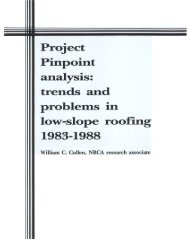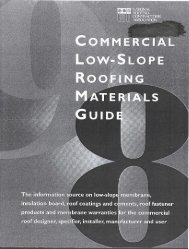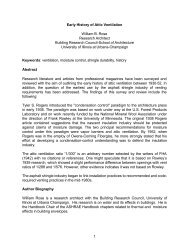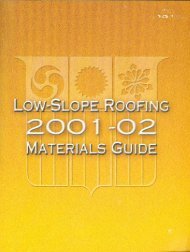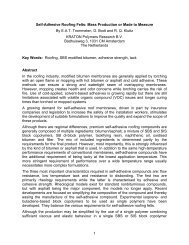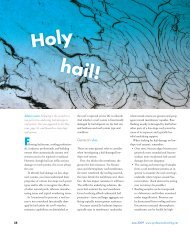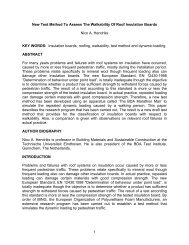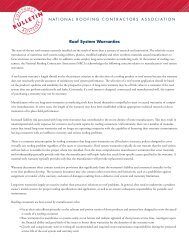- Page 2 and 3:
2000LOW-SLOPEROOFINGMATERIALSGUIDET
- Page 4 and 5:
Table of ContentsLow-Slope Roofing
- Page 6 and 7:
Low-Slope Roofing Materials GuideIn
- Page 8 and 9:
General IndexWOOD FIBERBOARD INSULA
- Page 10 and 11:
General IndexWOOD FIBERBOARD INSULA
- Page 12 and 13:
General IndexWOOD FIBERBOARD INSULA
- Page 14 and 15:
General IndexWOOD FIBERBOARD INSULA
- Page 16 and 17:
General IndexWOOD FIBERBOARD INSULA
- Page 18 and 19:
General IndexWOOD FIBERBOARD INSULA
- Page 20 and 21:
General IndexWOOD FIBERBOARD INSULA
- Page 22 and 23:
General IndexWOOD FIBERBOARD INSULA
- Page 24 and 25:
General IndexWOOD FIBERBOARD INSULA
- Page 27 and 28:
Information on Section 1: Roof Cove
- Page 29 and 30:
3. Type (ASTM standard designation)
- Page 31 and 32:
Warranty information for PIB single
- Page 33 and 34:
11. ASTM E 331 water penetration12.
- Page 35 and 36:
EPDMIndex to Roof CoveringsSPRAY PO
- Page 37 and 38:
EPDMIndex to Roof CoveringsSPRAY PO
- Page 39 and 40:
EPDMIndex to Roof CoveringsSPRAY PO
- Page 41 and 42:
EPDMIndex to Roof CoveringsSPRAY PO
- Page 43 and 44:
EPDMIndex to Roof CoveringsSPRAY PO
- Page 45 and 46:
EPDMIndex to Roof CoveringsSPRAY PO
- Page 47 and 48:
THIS PAGE LEFT BLANK INTENTIONALLY
- Page 49 and 50:
Built-up RoofingBARRETT COMPANY, TH
- Page 51 and 52:
Built-up RoofingCELOTEX CORP.7YESDI
- Page 53 and 54:
Built-up RoofingAGS-H+ G/A-H+ AGS-H
- Page 55 and 56:
Built-up RoofingM-N-B4 M-C-B3 M-N-B
- Page 57 and 58:
Built-up Roofing1000-3 1000-4 1000-
- Page 59 and 60:
Built-up RoofingHAI-335-MC HAW-325-
- Page 61 and 62:
Built-up RoofingFIRESTONE BUILDING
- Page 63 and 64:
Built-up RoofingI-B-3- NN-0- I-0-3-
- Page 65 and 66:
Built-up RoofingHENRY COMPANY18YESD
- Page 67 and 68:
Built-up RoofingJOHNS MANVILLE INTE
- Page 69 and 70:
Built-up RoofingKOPPERS INDUSTRIES,
- Page 71 and 72:
Built-up RoofingS3-XEX S3-BEX S4-BB
- Page 73 and 74:
Built-up RoofingM4-FHB M4-FBB M4-FE
- Page 75 and 76:
Built-up RoofingM2-CXD M2-DXD M2-EX
- Page 77 and 78:
Built-up RoofingMFM BUILDING PRODUC
- Page 79 and 80:
Built-up RoofingTAMKO ROOFINGTREMCO
- Page 81 and 82:
Built-up RoofingTRI-PLY5YESDISTRIBU
- Page 83 and 84:
Built-up RoofingBUR PLUS M.-PLY M.-
- Page 85 and 86:
Modified Bitumen Part 1 - General I
- Page 87 and 88:
Modified Bitumen Part 1 - General I
- Page 89 and 90:
Modified Bitumen Part 1 - General I
- Page 91 and 92:
Modified Bitumen Part 1 - General I
- Page 93 and 94:
Modified Bitumen Part 1 - General I
- Page 95 and 96:
Modified Bitumen Part 1 - General I
- Page 97 and 98:
Modified Bitumen Part 1 - General I
- Page 99 and 100:
Modified Bitumen Part 1 - General I
- Page 101 and 102:
Modified Bitumen Part 1 - General I
- Page 103 and 104:
Modified Bitumen Part 1 - General I
- Page 105 and 106:
Modified Bitumen Part 1 - General I
- Page 107 and 108:
Modified Bitumen Part 1 - General I
- Page 109 and 110:
Modified Bitumen Part 1 - General I
- Page 111 and 112:
Modified Bitumen Part 1 - General I
- Page 113 and 114:
Modified Bitumen Part 1 - General I
- Page 115 and 116:
Modified Bitumen Part 1 - General I
- Page 117 and 118: Modified Bitumen Part 1 - General I
- Page 119 and 120: Modified Bitumen Part 1 - General I
- Page 121 and 122: Modified Bitumen Part 1 - General I
- Page 123 and 124: THIS PAGE LEFT BLANK INTENTIONALLY
- Page 125 and 126: APP Modified Bitumen Part 2: Test R
- Page 127 and 128: APP Modified Bitumen Part 2: Test R
- Page 129 and 130: APP Modified Bitumen Part 2: Test R
- Page 131 and 132: APP Modified Bitumen Part 2: Test R
- Page 133 and 134: APP Modified Bitumen Part 2: Test R
- Page 135 and 136: APP Modified Bitumen Part 2: Test R
- Page 137 and 138: APP Modified Bitumen Part 2: Test R
- Page 139 and 140: APP Modified Bitumen Part 2: Test R
- Page 141 and 142: SBS Modified Bitumen Part 2: Test R
- Page 143 and 144: SBS Modified Bitumen Part 2: Test R
- Page 145 and 146: SBS Modified Bitumen Part 2: Test R
- Page 147 and 148: SBS Modified Bitumen Part 2: Test R
- Page 149 and 150: SBS Modified Bitumen Part 2: Test R
- Page 151 and 152: SBS Modified Bitumen Part 2: Test R
- Page 153 and 154: SBS Modified Bitumen Part 2: Test R
- Page 155 and 156: SBS Modified Bitumen Part 2: Test R
- Page 157 and 158: SBS Modified Bitumen Part 2: Test R
- Page 159 and 160: SBS Modified Bitumen Part 2: Test R
- Page 161 and 162: SBS Modified Bitumen Part 2: Test R
- Page 163 and 164: SBS Modified Bitumen Part 2: Test R
- Page 165 and 166: SBS Modified Bitumen Part 2: Test R
- Page 167: SBS Modified Bitumen Part 2: Test R
- Page 171 and 172: SBS Modified Bitumen Part 2: Test R
- Page 173 and 174: SBS Modified Bitumen Part 2: Test R
- Page 175 and 176: SBS Modified Bitumen Part 2: Test R
- Page 177 and 178: SBS Modified Bitumen Part 2: Test R
- Page 179 and 180: SBS Modified Bitumen Part 2: Test R
- Page 181 and 182: SBS Modified Bitumen Part 2: Test R
- Page 183 and 184: SBS Modified Bitumen Part 2: Test R
- Page 185 and 186: Modified Bitumen Part 3: Modified B
- Page 187 and 188: Modified Bitumen Part 3: Modified B
- Page 189 and 190: Modified Bitumen Part 3: Modified B
- Page 191 and 192: Modified Bitumen Part 3: Modified B
- Page 193 and 194: Modified Bitumen Part 3: Modified B
- Page 195 and 196: Modified Bitumen Part 3: Modified B
- Page 197 and 198: Modified Bitumen Part 3: Modified B
- Page 199 and 200: Modified Bitumen Part 3: Modified B
- Page 201 and 202: Modified Bitumen Part 3: Modified B
- Page 203 and 204: Modified Bitumen Part 3: Modified B
- Page 205 and 206: THIS PAGE LEFT BLANK INTENTIONALLY
- Page 207 and 208: PVC Part 1: General InformationGAF
- Page 209 and 210: PVC Part 1: General InformationIB R
- Page 211 and 212: PVC Part 1: General InformationSARN
- Page 213 and 214: PVC Part 2: Test ResultsTest descri
- Page 215 and 216: PVC Part 2: Test ResultsTest descri
- Page 217 and 218: THIS PAGE INTENTIONALLY LEFT BLANK
- Page 219 and 220:
EPDM Part 1: General InformationCAR
- Page 221 and 222:
EPDM Part 1: General InformationERS
- Page 223 and 224:
EPDM Part 1: General InformationINT
- Page 225 and 226:
EPDM Part 1: General InformationOLY
- Page 227 and 228:
EPDM Part 1: General InformationROO
- Page 229 and 230:
EPDM Part 2: Test ResultsTest descr
- Page 231 and 232:
EPDM Part 2: Test ResultsTest descr
- Page 233 and 234:
EPDM Part 2: Test ResultsTest descr
- Page 235 and 236:
CSPE (Hypalon) Part 1: General Info
- Page 237 and 238:
CSPE (Hypalon) Part 2: Test Results
- Page 239 and 240:
PIB (Polyisobutylene ) Part 2: Test
- Page 241 and 242:
TPO Part 1: General InformationGENF
- Page 243 and 244:
TPO Part 2: Test ResultsTest descri
- Page 245 and 246:
Other Prefabricated Sheet-Applied M
- Page 247 and 248:
Other Prefabricated Sheet-Applied M
- Page 249 and 250:
THIS PAGE LEFT BLANK INTENTIONALLY
- Page 251 and 252:
Other Prefabricated Sheet-Applied M
- Page 253 and 254:
Other Prefabricated Sheet-Applied M
- Page 255 and 256:
Other Prefabricated Sheet-Applied M
- Page 257 and 258:
Other Prefabricated Sheet-Applied M
- Page 259 and 260:
Spray Polyurethane Foam-Based Syste
- Page 261 and 262:
Spray Polyurethane Foam-Based Syste
- Page 263 and 264:
Spray Polyurethane Foam-Based Syste
- Page 265 and 266:
Spray Polyurethane Foam-Based Syste
- Page 267 and 268:
Spray Polyurethane Foam-Based Syste
- Page 269 and 270:
Spray Polyurethane Foam-Based Syste
- Page 271 and 272:
Spray Polyurethane Foam-Based Syste
- Page 273 and 274:
Spray Polyurethane Foam-Based Syste
- Page 275 and 276:
Spray Polyurethane Foam-Based Syste
- Page 277 and 278:
Spray Polyurethane Foam-Based Syste
- Page 279 and 280:
Metal Roof Panels1. COMPANY NAME AE
- Page 281 and 282:
Metal Roof Panels1. COMPANY NAME AE
- Page 283 and 284:
Metal Roof Panels1. COMPANY NAME AM
- Page 285 and 286:
Metal Roof Panels1. COMPANY NAME AR
- Page 287 and 288:
Metal Roof Panels1. COMPANY NAME AT
- Page 289 and 290:
Metal Roof Panels1. COMPANY NAME BE
- Page 291 and 292:
Metal Roof Panels1. COMPANY NAME BE
- Page 293 and 294:
Metal Roof Panels1. COMPANY NAME BU
- Page 295 and 296:
Metal Roof Panels1. COMPANY NAME EN
- Page 297 and 298:
Metal Roof Panels1. COMPANY NAME FA
- Page 299 and 300:
Metal Roof Panels1. COMPANY NAME FO
- Page 301 and 302:
Metal Roof Panels1. COMPANY NAME IN
- Page 303 and 304:
Metal Roof Panels1. COMPANY NAME MB
- Page 305 and 306:
Metal Roof Panels1. COMPANY NAME MB
- Page 307 and 308:
Metal Roof Panels1. COMPANY NAME MC
- Page 309 and 310:
Metal Roof Panels1. COMPANY NAME ME
- Page 311 and 312:
Metal Roof Panels1. COMPANY NAME ME
- Page 313 and 314:
Metal Roof Panels1. COMPANY NAME PE
- Page 315 and 316:
Metal Roof Panels1. COMPANY NAME ST
- Page 317 and 318:
Metal Roof Panels1. COMPANY NAME UN
- Page 319 and 320:
BUTLER MANUFACTURING COMPANYMR-24 i
- Page 321 and 322:
quality specifications and are avai
- Page 323:
up to 20-ft. X 102-ft. (2,040 squar
- Page 326 and 327:
Cellular GlassCellular glass insula
- Page 328 and 329:
Index to Rigid Board InsulationCOMP
- Page 330 and 331:
Index to Rigid Board InsulationCOMP
- Page 332 and 333:
Expanded Polystyrene Roof Insulatio
- Page 334 and 335:
Extruded Polystyrene Roof Insulatio
- Page 336 and 337:
Extruded Polystyrene Roof Insulatio
- Page 338 and 339:
Extruded Polystyrene Roof Insulatio
- Page 340 and 341:
Glass Fiber/Mineral Fiber Roof Insu
- Page 342 and 343:
Wood Fiberboard Roof Insulation Boa
- Page 344 and 345:
Perlite Roof Insulation Board(Homog
- Page 346 and 347:
Polyisocyanurate Roof Insulation Bo
- Page 348 and 349:
Polyisocyanurate Roof Insulation Bo
- Page 350 and 351:
Polyisocyanurate Roof Insulation Bo
- Page 352 and 353:
Polyisocyanurate Roof Insulation Bo
- Page 354 and 355:
Polyisocyanurate Roof Insulation Bo
- Page 356 and 357:
Composite Roof Insulation Board1. C
- Page 358 and 359:
Composite Roof Insulation Board1. C
- Page 360 and 361:
Appendix, Rigid Board InsulationAFM
- Page 362 and 363:
Material Safety Data Sheet for comp
- Page 364 and 365:
important for adhered roof systems
- Page 366 and 367:
systems and in place of other roof
- Page 368:
THIS PAGE LEFT BLANK INTENTIONALLY3
- Page 371 and 372:
8. Shank type9. Point type10. Metho
- Page 373 and 374:
Index to Roof FastenersLTWT CONCRET
- Page 375 and 376:
Roof Fasteners: Steel Decks1. COMPA
- Page 377 and 378:
Roof Fasteners: Steel Decks1. COMPA
- Page 379 and 380:
Roof Fasteners: Steel Decks1. COMPA
- Page 381 and 382:
Roof Fasteners: Steel Decks1. COMPA
- Page 383 and 384:
Roof Fasteners: Steel Decks1. COMPA
- Page 385 and 386:
Roof Fasteners: Steel Decks1. COMPA
- Page 387 and 388:
Roof Fasteners: Steel Decks1. COMPA
- Page 389 and 390:
Roof Fasteners: Steel Decks1. COMPA
- Page 391 and 392:
Roof Fasteners: Steel Decks1. COMPA
- Page 393 and 394:
Roof Fasteners: Steel Decks1. COMPA
- Page 395 and 396:
Roof Fasteners: Steel Decks1. COMPA
- Page 397 and 398:
Roof Fasteners: Steel Decks1. COMPA
- Page 399 and 400:
Roof Fasteners: Steel Decks1. COMPA
- Page 401 and 402:
Roof Fasteners: Wood Decks1. COMPAN
- Page 403 and 404:
Roof Fasteners: Wood Decks1. COMPAN
- Page 405 and 406:
Roof Fasteners: Wood Decks1. COMPAN
- Page 407 and 408:
Roof Fasteners: Wood Decks1. COMPAN
- Page 409 and 410:
Roof Fasteners: Wood Decks1. COMPAN
- Page 411 and 412:
Roof Fasteners: Wood Decks1. COMPAN
- Page 413 and 414:
Roof Fasteners: Wood Decks1. COMPAN
- Page 415 and 416:
Roof Fasteners: Wood Decks1. COMPAN
- Page 417 and 418:
Roof Fasteners: Wood Decks1. COMPAN
- Page 419 and 420:
Roof Fasteners: Wood Decks1. COMPAN
- Page 421 and 422:
Roof Fasteners: Wood Decks1. COMPAN
- Page 423 and 424:
Roof Fasteners: Wood Decks1. COMPAN
- Page 425 and 426:
Roof Fasteners: Wood Decks1. COMPAN
- Page 427 and 428:
Roof Fasteners: Wood Decks1. COMPAN
- Page 429 and 430:
Roof Fasteners: Wood Decks1. COMPAN
- Page 431 and 432:
Roof Fasteners: Wood Decks1. COMPAN
- Page 433 and 434:
Roof Fasteners: Concrete DecksCOMPA
- Page 435 and 436:
Roof Fasteners: Concrete Decks1. CO
- Page 437 and 438:
Roof Fasteners: Concrete Decks1. CO
- Page 439 and 440:
Roof Fasteners: Concrete Decks1. CO
- Page 441 and 442:
Roof Fasteners: Concrete Decks1. CO
- Page 443 and 444:
Roof Fasteners: Concrete Decks1. CO
- Page 445 and 446:
Roof Fasteners: Concrete Decks1. CO
- Page 447 and 448:
Roof Fasteners: Concrete Decks1. CO
- Page 449 and 450:
Roof Fasteners: Concrete Decks1. CO
- Page 451 and 452:
Roof Fasteners: Lightweight Concret
- Page 453 and 454:
Roof Fasteners: Lightweight Concret
- Page 455 and 456:
Roof Fasteners: Lightweight Concret
- Page 457 and 458:
Roof Fasteners: Lightweight Concret
- Page 459 and 460:
Roof Fasteners: Lightweight Concret
- Page 461 and 462:
Roof Fasteners: Lightweight Concret
- Page 463 and 464:
Roof Fasteners: Lightweight Concret
- Page 465 and 466:
Roof Fasteners: Lightweight Concret
- Page 467 and 468:
Roof Fasteners: Lightweight Concret
- Page 469 and 470:
Roof Fasteners: Lightweight Concret
- Page 471 and 472:
Roof Fasteners: Lightweight Concret
- Page 473 and 474:
Plasti-Cap fasteners are not to be
- Page 475:
THIS PAGE LEFT BLANK INTENTIONALLY
- Page 478 and 479:
Index to Cement and CoatingsCEMENT
- Page 480 and 481:
Roof Cements and Coatings Part 1: G
- Page 482 and 483:
Roof Cements and Coatings Part 1: G
- Page 484 and 485:
Roof Cements and Coatings Part 1: G
- Page 486 and 487:
Roof Cements and Coatings Part 1: G
- Page 488 and 489:
Roof Cements and Coatings Part 1: G
- Page 490 and 491:
Roof Cements and Coatings Part 1: G
- Page 492 and 493:
Roof Cements and Coatings Part 1: G
- Page 494 and 495:
Roof Cements and Coatings Part 1: G
- Page 496 and 497:
Roof Cements and Coatings Part 1: G
- Page 498 and 499:
Roof Cements and Coatings Part 1: G
- Page 500 and 501:
Roof Cements and Coatings Part 1: G
- Page 502 and 503:
Roof Cements and Coatings Part 1: G
- Page 504 and 505:
Roof Cements and Coatings Part 1: G
- Page 506 and 507:
Roof Cements and Coatings Part 1: G
- Page 508 and 509:
Roof Cements and Coatings Part 1: G
- Page 510 and 511:
Roof Cements and Coatings Part 1: G
- Page 512 and 513:
Roof Cements and Coatings Part 1: G
- Page 514 and 515:
Roof Cements and Coatings Part 1: G
- Page 516 and 517:
Roof Cements and Coatings Part 1: G
- Page 518 and 519:
Roof Cements and Coatings Part 1: G
- Page 520 and 521:
Roof Cements and Coatings Part 1: G
- Page 522 and 523:
Roof Cements and Coatings Part 1: G
- Page 524 and 525:
Roof Cements and Coatings Part 1: G
- Page 526 and 527:
Roof Cements and Coatings Part 1: G
- Page 528 and 529:
Roof Cements and Coatings Part 2: T
- Page 530 and 531:
Roof Cements and Coatings Part 2: T
- Page 532 and 533:
Roof Cements and Coatings Part 2: T
- Page 534 and 535:
Roof Cements and Coatings Part 2: T
- Page 536 and 537:
Roof Cements and Coatings Part 2: T
- Page 538 and 539:
Roof Cements and Coatings Part 2: T
- Page 540 and 541:
Roof Cements and Coatings Part 2: T
- Page 542 and 543:
Roof Cements and Coatings Part 2: T
- Page 544 and 545:
Roof Cements and Coatings Part 2: T
- Page 546 and 547:
Roof Cements and Coatings Part 2: T
- Page 548 and 549:
Roof Cements and Coatings Part 2: T
- Page 550 and 551:
Roof Cements and Coatings Part 2: T
- Page 552 and 553:
Roof Cements and Coatings Part 2: T
- Page 554:
Appendix, Cement and CoatingsERSYST
- Page 557 and 558:
the warranty section of the Low-Slo
- Page 559 and 560:
from the information contained unde
- Page 561 and 562:
NRCA also asks manufacturers if the
- Page 563 and 564:
Index to WarrantiesWarrantyWarranty
- Page 565 and 566:
Index to WarrantiesWarrantyWarranty
- Page 567 and 568:
Roof Membrane Warranties (Built-Up,
- Page 569 and 570:
Roof Membrane Warranties (Built-Up,
- Page 571 and 572:
Roof Membrane Warranties (Built-Up,
- Page 573 and 574:
Roof Membrane Warranties (Built-Up,
- Page 575 and 576:
Roof Membrane Warranties (Built-Up,
- Page 577 and 578:
Roof Membrane Warranties (Built-Up,
- Page 579 and 580:
Roof Membrane Warranties (Built-Up,
- Page 581 and 582:
Roof Membrane Warranties (Built-Up,
- Page 583 and 584:
Roof Membrane Warranties (Built-Up,
- Page 585 and 586:
Roof Membrane Warranties (Built-Up,
- Page 587 and 588:
Roof Membrane Warranties (Built-Up,
- Page 589 and 590:
Roof Membrane Warranties (Built-Up,
- Page 591 and 592:
Roof Membrane Warranties (Built-Up,
- Page 593 and 594:
Roof Membrane Warranties (Built-Up,
- Page 595 and 596:
Roof Membrane Warranties (Built-Up,
- Page 597 and 598:
Roof Membrane Warranties (Built-Up,
- Page 599 and 600:
Roof Membrane Warranties (Built-Up,
- Page 601 and 602:
Roof Membrane Warranties (Built-Up,
- Page 603 and 604:
Roof Membrane Warranties (Built-Up,
- Page 605 and 606:
Roof Membrane Warranties (Built-Up,
- Page 607 and 608:
Roof Membrane Warranties (Built-Up,
- Page 609 and 610:
Roof Membrane Warranties (Built-Up,
- Page 611 and 612:
Roof Membrane Warranties (Built-Up,
- Page 613 and 614:
Roof Membrane Warranties (Built-Up,
- Page 615 and 616:
Roof Membrane Warranties (Built-Up,
- Page 617 and 618:
Roof Membrane Warranties (Built-Up,
- Page 619 and 620:
Roof Membrane Warranties (Built-Up,
- Page 621 and 622:
624
- Page 623 and 624:
21. Contractor’s post-installatio
- Page 625 and 626:
17. Ineligible structure or buildin
- Page 627 and 628:
18. Pre-construction notice andappr
- Page 629 and 630:
13. Wind coverage/exclusions Warran
- Page 631 and 632:
11. Determination of warrantyapplic
- Page 633 and 634:
16. Minimum charge None Minimum roo
- Page 635 and 636:
13. Wind coverage/exclusions14. Spe
- Page 637 and 638:
16. Minimum charge 10 years: $500;
- Page 639 and 640:
19. Approved, authorized, or licens
- Page 641 and 642:
14. Specific conditions to makewarr
- Page 643 and 644:
12. Specific exclusions from covera
- Page 645 and 646:
17. Ineligible structure or buildin
- Page 647 and 648:
14. Specific conditions to makewarr
- Page 649 and 650:
17. Ineligible structure or buildin
- Page 651 and 652:
12. Specific exclusions from covera
- Page 653 and 654:
17. Ineligible structure or buildin
- Page 655 and 656:
14. Specific conditions to makewarr
- Page 657 and 658:
14. Specific conditions to makewarr
- Page 659 and 660:
13. Wind coverage/exclusions Warran
- Page 661 and 662:
16. Minimum chargeNone10 years: $20
- Page 663 and 664:
14. Specific conditions to makewarr
- Page 665:
17. Ineligible structure or buildin
- Page 668 and 669:
Index to Incomplete DataIncomplete
- Page 670:
Section 6: Incomplete DataIn publis


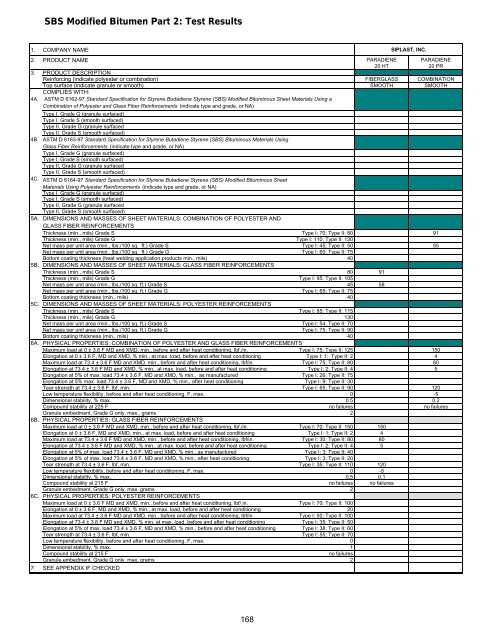
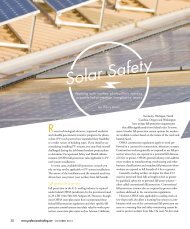
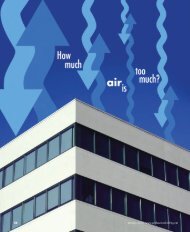
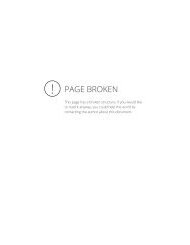
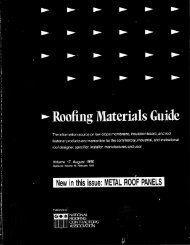
![Wm] - National Roofing Contractors Association](https://img.yumpu.com/36696816/1/190x245/wm-national-roofing-contractors-association.jpg?quality=85)
